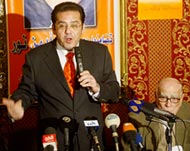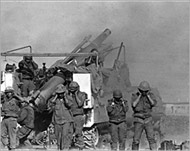Egypt’s leader shows personal side
President Husni Mubarak showed Egyptians a rare personal side in the first part of a six-hour interview aired on state television, in a move ahead of the country’s first multi-candidate presidential elections in May.

Relaxed yet serious, the 77-year-old leader, who has been president for 24 years, focused on his military experiences in the first interview on Sunday.
In previews for the next two interviews, to be aired on Monday and Tuesday, Mubarak is seen in a lighter mood, laughing and casually dressed.
He is expected to announce during Tuesday’s final instalment that he intends to run for another six-year term later this year.
But even before the interview was aired, Mubarak’s potential challengers criticised it, saying the deck is stacked against them and they are unlikely to get similar airtime. “Here is the question now: Who paid for the film? And will this opportunity be given to others?” asked opposition member Ayman Nur.
It was not possible to determine who had paid for the programme, but state-controlled television is closely run by the government.
Nur suggested that Mubarak’s more western-minded son, Jamal – sometimes touted as his political heir – was behind the show, part of a rush of materials promoting Mubarak as he heads into his first real campaign. A popular song extols his virtues and a book by Mubarak is coming.
Human interest
The television interview showed an attempt at an image change: Mubarak, who usually gives redundant speeches or makes only formal appearances, was seen in previews laughing with the presenter, wearing a light blue casual suit without a tie and with dyed hair and makeup.
 |
|
Ayman Nur (L) questioned if the |
The choice of the director – Sharif Arafa, known for humorous political movies – raised some eyebrows. The producer, Imad al-Din Adib, told Egypt’s leading newspaper, Al-Ahram, that Mubarak answered 199 questions in “an unprecedented openness … There were no red lines.”
Unlike his predecessors, Mubarak’s daily life in the palace and the life of his family have been hidden. When Al-Ahram ran on its front page a picture of Mubarak joyfully carrying his grandson a few years ago, many Egyptians reacted with shock and amazement.
In the first two-hour interview, Mubarak focused on his relationship with former presidents, including Anwar al-Sadat, and his personal experiences in the era between the 1967 and 1973 wars with Israel. Mubarak was commander of an air base in the first war, and by the 1973 war he was chief of the
air force.
Reflections
“The (1967) defeat was so tough,” he said. “I remember that when our air forces were raided … we weren’t able to look in the face of the people.”
Israel seized Egypt’s Sinai Peninsula and other Arab territories in that war. The Sinai was returned to Egypt in 1982 as part of the Camp David peace agreement reached in 1979.
When asked if he had used friends in high places to advance in the military, Mubarak vehemently answered: “I lived all my life without seeking cronyism. Never!”
Asked whether Egypt’s president should be a politician or a military man who is qualified to take the decision to go to war, Mubarak answered that war is a political move, but the president “must have long experience to take this decision.”
Second episode
In the second episode, Mubarak will give his account of the 1973 war, in addition to the transitional period in his life when he moved from the position of chief of the air force to vice-president. He became president after Sadat’s assassination in 1981.
 |
|
In the second episode, Mubarak |
In the third interview, he is expected to discuss his political plans and reform ideas, and is expected to announce his candidacy for another presidential term.
At the end of February, Mubarak took the country by surprise when he ordered the parliament amend the constitution to give more than one candidate the opportunity to run in presidential elections for the first time in Egypt’s modern history.
Before this, Egyptians voted only yes or no for one candidate.
Egyptian politics
Many analysts say, people find it difficult to think of a politician who can be an alternative to Mubarak. Despite that general feeling, Nur has entered the race and said he and his al-Ghad (Tomorrow) party plan to produce a film of their own in coming weeks.
However, it will be only 20 minutes long, and it was unclear how it would be aired. “It will be a very nice one, very different, and reflects the dreams, suffering and ambitions of this Egyptian generation,” Nur said.